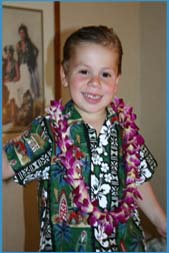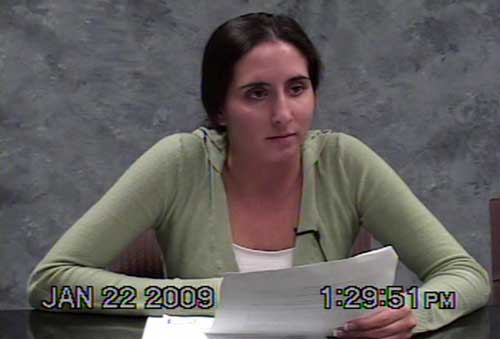Maryam Safinya
Employed by COAC as a Summer Activity Camp counselor and was on duty at the time of the drowning.
Nearly four years after Yoni's death, four years of denying any responsibility by the defendants, on the first day of trial March 24, 2009, for the first time this defendant admitted (through her attorney) that she was negligent and the cause of Yoni Gottesman's death. Yet, in depositions she denied being negligent or any responsibility in Yoni's death.


Maryam Safinya was negligent and the cause of Yoni Gottesman's death.
Testimony Excerpt - Maryam Safinya 01/22/2009
Q. Did you speak to anybody, whether it was
Ms. Heller or Julie Main or Charlotte Valentine or even
a lifeguard, about whose responsibility it was to make
sure the kids didn't drown?
A. No.
Q. Now, if Mr. Shipley said that he conducted
himself this way with children all summer long, would
you agree with that?
A. Oh, yes. Yes.
Q. So you observed him throwing kids -- or
lifting them out and dunking them in the water, lifting
them out and dunking them in the water repeatedly over
the summer?
A. Yes.
Q. BY MR. CLARKE: Well, I showed you the camp
guidelines that you have right in front of you right
now, right?
A. Yes.
Q. One of those guidelines is camp counselors
must be in the pool with the kids, right?
A. Correct.
Q. You weren't in the pool with the kids, were
you?
A. I believe that -- I see that this says
counselors need to be in the pool with the kids. In
my opinion, if all the counselors are in the pool,
then who is looking after the kids on the deck.
Q. So is a rule you disagreed with?
A. Yes.
Q. And so you chose not to follow it?
A. There was no objection to my actions from any
higher authority. I felt it was a responsible way of
making sure the kids are okay wherever they are.
Q. And seeing this, does it refresh your
recollection as to where you were during the time that
Yoni was being dunked and the time that he floated
under the water?
A. Right now I'm in complete shock. This entire
time I believed I was near the stairs.
Q. And it turns out that's not the case, right?
A. It is not.
Q. You were behind and to the right of the
lifeguard stand. Do you believe that you were seated
with Jenny Darling?
A. Yes.
Q. Okay. What do you think you were doing with
her that whole time? Talking?
A. I do not know.
Q. Well, you were not telling kids to stay in
the shallow end where they were required to stay, were
you?
A. I know I was telling children by the stairs
what I had told you earlier. I just was not standing
where I told you I was.
Q. Well, what did you do? Shout? Shout at the
kids from where you were?
A. The five feet of distance, yes.
Q. Were you seated in a spot that would make
it easy for you to see and identify children that had
failed the swim test?
A. No, I was not.
Q. Why not?
A. I was not near the pool side.
Q. Well, part of your job was -- in fact, one of
the -- perhaps the most important aspects of your job,
when the kids were in the pool, was to see which ones
had passed the swim test and see which ones had not,
right? Is that right?
A. Yes.
Q. And the reason for doing that was to ensure
that a kid who couldn't swim didn't go out into deep
water where the kid could drown, right?
A. Yes.
Q. And you saw in this film that Yoni was in
water that was far too deep for him; isn't that true?
A. Yes.
Q. And whether it was Sam Shipley who brought
him there or some other way, that's where he ended up,
right?
A. Yes.
Q. And your job was to stop that from happening?
A. Correct.
Q. And you didn't do that, did you?
A. I did not.
Q. So seeing all this and remembering this very,
very tragic event, do you feel responsible for what
happened?
A. I believe there was a system in place that we
have gone over and it failed, and I do consider myself
somewhat responsible. I do not believe I am fully
responsible for the events that occurred.
But I do see that my location was a bad
location. And if I had been near -- closer to the pool
edge, there could have been a higher possibility to see
Yoni floating.
Q. BY MR. CLARKE: Why do you think there's a
rule in this camp that says all camp counselors should
be in the pool with kids while they're swimming?
THE WITNESS: I do not know.
Q. BY MR. CLARKE: Well, do you think it has to
do with safety?
THE WITNESS: I believe that if counselors
are in the pool, are out of the pool, I think they are
equally as able to help or save a child from drowning.
Q. BY MR. CLARKE: For example, if there's a
camp counselor seated on a lounge chair next to another
camp counselor outside of the pool behind and to the
right of the lifeguard, that camp -- those two camp
counselors are just as able to save a drowning child if
they were in the pool with the child?
Q. BY MR. CLARKE: Is that what you're telling
us, Ms. Safinya?
A. Can you please repeat the question for me?
Q. Sure. You're saying that whether you're in
the pool or out of the pool, you're just as able to
save a child from drowning. Isn't that what you're
saying?
A. I believe so, but it matters where you are
located outside of the pool.
Q. So had you been standing where you initially
told us you were, maybe you would have been able to see
the boy floating for eight and a half minutes, right?
THE WITNESS: I believe that near the pool
would have been a better location, yes.
Q. BY MR. CLARKE: You never saw the pool rules,
right?
A. No, I did not.
Q. So you saw what Sam Shipley was doing in the
pool, right?
A. Yes.
Q. No. On the day Yoni died, were you doing
everything you were trained to do?
A. Yes.
Q. Okay. Were you trained to sit on a lounge
chair instead of stand by the pool?
THE WITNESS: No, I was not trained to sit
down.
Q. BY MR. CLARKE: Okay. But you were sitting,
right?
A. When I'm watching the video, I see myself
walking out -- walking into the frame. I was near
the lounge chair. I don't know if I was standing or
sitting.
Q. Well, do you believe that a contributing
factor to Yoni's death was because you were not doing
your job properly?
THE WITNESS: Can you define "properly"?
MR. CLARKE: Sure.
Q. The way in which you were trained was to
vigilantly observe the pool while the kids were in it,
correct?
A Correct.
Q And to make sure that the kids who couldn't
swim and who failed their test were in the shallow end,
right?
A. Correct.
Q. You were trained to do that, weren't you?
A. Yes.
Q. And you didn't do that on this day?
A. I was not by the pool deck, at the edge of
the pool. I was not in the proper place.
Q. And so what we have here is three camp
counselors who were all failing to do their jobs,
right?
THE WITNESS: From what you have stated the
specifics, correct.
Q. BY MR. CLARKE: Do you think the lifeguards
were doing their job?
Q. BY MR. CLARKE: Vigilantly watching the pool
for any kids that might be drowning?
A. For the amount of time their eyes were not on
the pool, I believe that could have -- that should have
been different.
Q. In other words, they weren't doing their jobs
either, right?
THE WITNESS: Yes.
Q. BY MR. CLARKE: And do you attribute this to
just all five of you failed or do you attribute this to
a breakdown in the training that the club provided to
you all?
Q. BY MR. CLARKE: The failure to do your jobs.
Q. BY MR. CLARKE: The failure of all five to do
your jobs.
THE WITNESS: Can you please repeat the
question?
MR. CLARKE: Sure.
Q. I'm wondering how it happened that all five
of you failed in some respect to do your jobs that day.
Was it just because you were all having a bad day or is
it because you weren't trained properly?
THE WITNESS: I have no explanation.
Q. BY MR. CLARKE: Do you think you were trained
properly?
THE WITNESS: I believe that I was not CPR
certified trained in the correct area. Otherwise I do
believe I did my job correctly, but I do see my faults
the day Yoni passed.
Q. BY MR. CLARKE: Did Ms. Heller train you how
to recognize a swimmer in distress?
THE WITNESS: No.
Q. BY MR. CLARKE: So in that respect you
weren't trained, right?
A. No, I was not trained.
Q. Were you trained in any respect on how to
ensure kids were safe in the water by Ms. Heller?
A. No.
The next involved person
To find out about the next person involved in Yoni's death
The People Involved
The people involved in Yoni's death and COAC
The complaint filed
The complaint filed against the people involved in Yoni's death and COAC
Judgement
To read the judgemt click
What COAC did after killing Yoni
To find out about what COAC did after killing Yoni